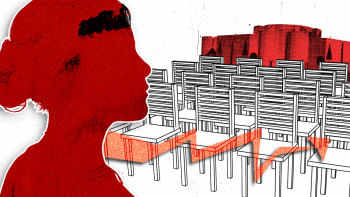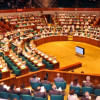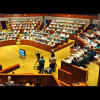In a parliament of businessmen, conflicts of interest reign supreme

In parliamentary democracy, parliamentary standing committees are important tools for holding the government accountable. These committees, consisting of members of both the government and opposition parties in various democratic countries, scrutinise the activities of the respective ministries of the government, review the proposed draft laws, and investigate corruption allegations.
As the absolute dominance of the ruling party has been established in the National Parliament of Bangladesh, the parliamentary committees are not seen to play any strong role in bringing the relevant ministries of the government to account. According to Article 188(2) of the Rules of Procedure of the National Parliament, "No member shall be appointed to a Committee who has a personal, pecuniary or direct interest in any matter which may be considered by that Committee." But due to the dominance of the ruling party and businessmen in parliament, these conflicts of interest have so far not been considered during the formation of parliamentary standing committees.
A study conducted by Transparency International Bangladesh (TIB) on the matter showed that, according to the information declared in their affidavits submitted to the Election Commission, the members of six committees of the 9th Parliament and five committees of the 10th Parliament had committee-related business involvement. But according to information collected from the local level on 38 members of 11 committees included as case-studies, 19 of these members of nine different committees had business in related areas. There have been allegations of exerting influence for promoting personal or business interests during decision-making within the committees. Besides, allegations of influence-peddling in decision-making have also been reported in instances where the ministers of relevant ministries are ex-officio members and where former ministers were appointed as chairs of the concerned standing committees.
The current 12 National Parliament is no exception in this regard. With an overwhelming majority comprising Awami League nominees and party supported "independent" candidates, 50 parliamentary committees were formed within just five working days of starting of the Parliament, of which 39 are related to the activities of various ministries. The remaining 11 committees are on parliamentary affairs. According to a report in The Daily Star, many members of 20 parliamentary standing committees own businesses in sectors they are supposed to watch over.
For example, Shamim Osman, a member of the standing committee on labour ministry, owns the garment factory "Wisdom Knitting Mills", while another member of the committee, SM Al Mamun, is involved in ship-breaking yards. Golam Kibria Tipu, a member of the parliamentary standing committee on shipping, has several launches.
Nizam Uddin Hazari, who has a manpower export business, is a member of the parliamentary committee on the Ministry of Expatriates' Welfare and Overseas Employment. Selim Mahmud, member of the parliamentary standing committee on the Ministry of Power, Energy and Minerals is a consultant on international laws and energy related issues. Abdur Rauf, another member of the committee, has petrol pump businesses. Mohammad Ali, who works as a contractor, is a member of the standing committee on the Ministry of Local Government, Rural Development and Co-operatives.
Moreover, as many as 12 MPs who were ministers and state ministers of the last government are appointed as chairmen of related standing committees, which may create obstacles in independent and objective scrutiny of allegations of corruption of the ministry during the former minister's tenure. For example, former commerce minister Tipu Munshi is the chairman of the parliamentary standing committee on Ministry of Commerce. Former foreign minister AK Abdul Momen is the chairman of the committee on Ministry of Foreign Affairs, while former finance minister AHM Mustafa Kamal is the chairman of the parliamentary body on Ministry of Finance. The same can be said for former ministers and state ministers who are now members of standing committees on the ministries of land, planning, agriculture, fisheries, CHT affairs, expatriate's welfare, housing, and youth and sports.
In fact, it's not just the parliamentary committees. The entire Parliament is dominated by businessmen. According to a report by Prothom Alo, the number of businessmen in the 12th National Parliament is at least 199, almost two thirds. They include several former presidents of the Federation of Bangladesh Chambers of Commerce & Industries (FBCCI), and owners of various groups of companies. At least 15 businessmen from the garment sector alone have been elected as members of Parliament. In 1973, 25 percent of the 283 members in the first National Parliament were lawyers, 23.67 percent were businessmen, 14.84 percent were farmers, 12.36 percent were politicians and 9.89 percent were teachers. Since then, the share of businessmen in the parliament has only increased year after year and as a result, there is almost no representation of people from other classes and professions in the current Parliament.
This has led to a dominance of businessmen in the policy-making of the state, which they are using to increase the expanse of their business and wealth. As there is no effective opposition party in the Parliament, there is no opportunity to bring these businessmen under accountability. They are making or amending laws and policies for their own benefit while preventing the drafting or formation of laws and policies against their class interests.
Because of this state-business nexus, businessmen in key sectors like banking, apparel, or power and energy are deciding what the laws, policies or incentives will be. The case of amending the Bank Companies Act in June 2023 to increase the term of directors of banks from nine years to 12 years can be discussed as an example. As reported by The Daily Star, the version of the bill that was first placed in the parliament did not seek to amend the tenure of the bank directors. And according to Prothom Alo, the written proposal for this extension was prepared by the Bangladesh Association of Banks (BAB), an organisation of private bank entrepreneurs and directors. This proposal, with little to no edits, was eventually submitted by a member of parliament of the government party in the form of an amendment, which was passed by the parliament without any discussion.
Due to this state-business entanglement, Parliament enacted the Quick Enhancement of Electricity and Energy Supply (Special Provisions) Act 2010 with immunity provisions. Under the protection of this law, one power and energy project after another have been implemented without competitive bidding, leading the country's economy to bear the burden of excessive capacity charges and increased energy imports. For this same reason, garment industry owners get more benefits from the government than any other sector in the country, including tax exemptions, cash assistance, exemption from customs duties, low interest loans from the Export Development Fund (EDF) and import of duty-free raw materials.
Democratic accountability of the government cannot be ensured unless this state-business nexus is brought to an end.
Kallol Mustafa is an engineer and writer who focuses on power, energy, environment and development economics. He can be reached at [email protected]
Views expressed in this article are the author's own.
Follow The Daily Star Opinion on Facebook for the latest opinions, commentaries and analyses by experts and professionals. To contribute your article or letter to The Daily Star Opinion, see our guidelines for submission.

 For all latest news, follow The Daily Star's Google News channel.
For all latest news, follow The Daily Star's Google News channel. 










Comments